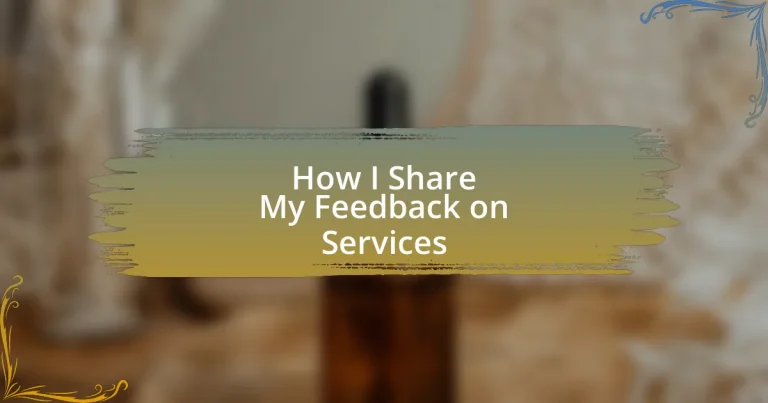Key takeaways:
- Alcohol reviews are highly subjective, reflecting personal tastes and emotions tied to experiences.
- Feedback on services is crucial for business improvement and fosters a sense of community among consumers.
- Effective reviews should be structured with a clear introduction, detailed descriptions, and a summary of personal recommendations.
- Encouraging others to share feedback creates a vibrant community and enhances the overall drinking experience.
Author: Clara Whitmore
Bio: Clara Whitmore is an acclaimed author and storyteller known for her captivating narratives and richly drawn characters. Her work spans several genres, including contemporary fiction and historical romance, often weaving elements of personal experience into her writing. Clara holds a Master’s degree in Creative Writing from the University of Edinburgh and has published three novels, which have garnered critical acclaim and a loyal readership. When she’s not writing, Clara enjoys exploring quaint bookstores and hosting literary workshops. She currently resides in Portland, Oregon, with her dog, Jasper.
Understanding Alcohol Reviews
When I began delving into alcohol reviews, I was struck by how subjective this space can be. It’s fascinating how a single bottle can evoke a range of opinions—what one person finds delightful, another may describe as off-putting. This subjectivity is where the beauty of reviews lies. Have you ever tried something that others raved about, only to wonder if your palate was broken?
Understanding alcohol reviews requires recognizing that personal taste plays a huge role. For instance, I recall trying a bold cabernet once that garnered high praise, yet it felt overwhelming to my taste buds. This experience taught me that reviews should be starting points—guides that reflect a variety of perspectives rather than absolute truths.
Moreover, the emotional connection people have with their favorite drinks can enhance the review experience. I’ve spoken to friends who reminisce about evenings spent enjoying a specific whiskey, infusing their reviews with nostalgia. Isn’t it intriguing how a simple beverage can conjure powerful memories and shared experiences? This is why alcohol reviews can feel so rich and personal, echoing the unique stories behind each bottle.
Importance of Feedback on Services
Feedback on services is crucial, as it helps businesses understand their customers’ experiences and expectations. I remember leaving a detailed review for a cocktail bar that missed the mark on service. My feedback wasn’t just a critique; it was a chance for them to reflect and improve. Have you ever thought about how a single review could spark change?
When I share my thoughts on a service, I’m not just voicing my opinion—I’m participating in a larger conversation. For instance, after a disappointing experience at a wine tasting, my feedback led to adjustments in their offerings. It’s satisfying to know that my words can contribute to a better experience for future customers. Don’t you see how empowering that can be?
Providing feedback can also foster a sense of community. I once engaged in a discussion online where several people echoed similar sentiments about a whiskey brand’s customer service. These collective experiences validated our feelings and encouraged the brand to take action. Isn’t it fascinating how sharing our thoughts can create ripples, ultimately leading to enhanced services that everyone can enjoy?
Common Platforms for Sharing Feedback
When it comes to sharing feedback, social media platforms like Facebook and Instagram become powerful tools. I recall posting about my experience with a new craft brewery on Instagram, tagging them in my story. The immediate interaction surprised me; they responded with gratitude and even invited me back for a complimentary tasting. Have you ever felt that thrill when a brand acknowledges your feedback?
Online review sites like Yelp and TripAdvisor are also popular for leaving detailed feedback. I remember crafting a thorough review about a distillery tour that felt rushed. Not only did it provide the owners with insights on how to improve their customer experience, but it also helped fellow enthusiasts make informed choices. Isn’t it interesting how we can guide others through our experiences?
Lastly, specialized forums and communities dedicated to alcohol enthusiasts create a space for deeper discussions. I participated in a whiskey tasting forum once, where I shared my thoughts on a particular bottle. The engagement was remarkable, as others weighed in with their experiences, creating a richer dialogue. Isn’t it great to connect with others who share the same passion and can offer advice based on real experiences?
How to Structure Your Feedback
When structuring my feedback, I always start with a clear and concise introduction. I like to state what I’m reviewing right at the beginning. For instance, if I’m discussing a specific wine, I mention its name and vintage before diving into my thoughts. This sets the stage and helps others quickly grasp the focus of my feedback. Do you find that a clear opening helps you articulate your thoughts better?
Next, I break down my feedback into specific components. I often touch on aspects like aroma, taste, and overall experience, providing concrete examples to illustrate my points. I remember reviewing a bold red wine, where I specifically described its notes of cherry and oak, making it easier for readers to imagine the flavors. This not only engages my audience but also adds a layer of depth to my review. Isn’t it fascinating how our descriptions can transport readers right into the moment?
Finally, I always wrap up with a summary or a personal recommendation. After sharing my insights, I reflect on whether I would buy the product again or suggest it to friends. For example, after a tasting event, I concluded by emphasizing the value of discovery in the world of spirits. It creates a well-rounded feedback piece and encourages others to consider my perspective. Have you noticed that summarizing your thoughts can leave a lasting impression?
Tips for Writing Effective Reviews
When I write reviews, I find it helps to be honest about my feelings. If a whiskey has a warm, comforting spice to it, I share how it reminded me of winter evenings spent by the fireplace. This emotional connection not only makes my review relatable but also helps readers understand the experience on a deeper level. Have you ever wondered how a product can evoke so much nostalgia?
Descriptive language is another crucial element. I dive into the colors, aromas, and textures in a way that paints a vivid picture. I once described a gin as having a “zesty brightness” and likened its flavor profile to a sunlit garden bursting with herbs. By using such imagery, I aim to engage the reader’s senses and imagination. Don’t you think it’s more captivating to feel as if you’re actually tasting the drink rather than just reading about it?
Lastly, I always consider my audience while writing. If I know my readers are fellow enthusiasts, I’ll dive deeper into technical details, like the distillation process or the aging method. However, if I think some are newcomers, I share simpler, relatable terms. I remember writing a review for a craft beer where I explained the hop varieties and their impact on flavor. Understanding who you’re speaking to can transform your review from mere words to an engaging conversation, right?
Encouraging Others to Share Feedback
Encouraging others to share feedback is invaluable in creating a vibrant community. I remember leaving a review on a small distillery’s website, and the owner responded with genuine appreciation. It struck me how much those words meant; they showed that feedback was not just appreciated but encouraged. Have you ever felt your thoughts were valued? It makes a difference.
When asking others for their insights, I often emphasize the impact their opinions can have. I once urged a friend to share her thoughts on a newly launched cocktail service, highlighting how her perspective could help others make informed choices. It’s fascinating how a simple nudge can spark someone’s willingness to share. How often do you consider the weight your feedback carries?
Moreover, I believe it’s essential to create a safe space for sharing. Sometimes, I host casual gatherings where we discuss various drinks and encourage everyone to express their opinions. These open discussions transform criticism into constructive conversations, leading to more engaging and insightful feedback. Why not invite a friend next time and explore together?


